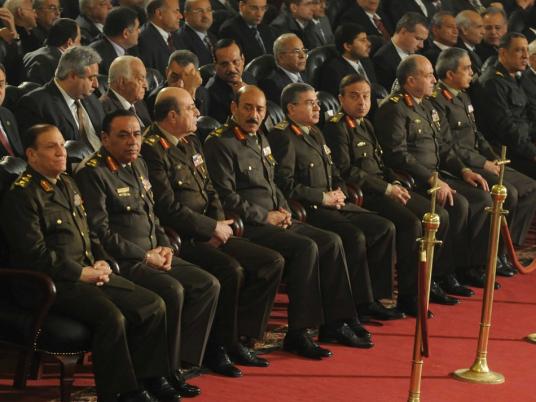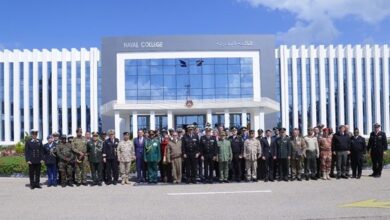
Under pressure from the Supreme Council of the Armed Forces, political forces announced Thursday that they had come to an agreement on the makeup of the Constituent Assembly tasked with writing Egypt’s next constitution.
The proposal was discussed with the military council before being officially announced. The political forces and the SCAF were locked in a meeting that extended to Thursday night, which resulted in the SCAF’s approval of the proposition. Field Marshal Tantawi has now called for a meeting on Tuesday, 12 June to select the members of the Constituent Assembly, according to Al-Masry Al-Youm.
Wafd Party leader Al-Sayed al-Badawy, who has been presiding over the negotiations on the Constituent Assembly, announced the results of the meeting.
The assembly has been split straight down the middle between Islamists and non-Islamists, signaling a victory for secular and liberal forces after the initial formation had a decidedly Islamist majority. The 50/50 split was reached after Jama’a al-Islamiya agreed to give up its two seats.
It was also agreed that in order to pass a proposed article for the new constitution, the article must be approved by a 67 percent vote. If the article does not garner the required percentage of votes, it would be reworded and then voted on again, with only 57 percent needed to pass it the second time.
From Wednesday night until the early hours of Thursday, political party leaders had locked heads to reach this agreement before the 48-hour deadline imposed by the SCAF. The SCAF stated that if political forces failed to reach an agreement on the Constituent Assembly’s composition, the generals would issue a supplement to the Constitutional Declaration.
Representatives from the Muslim Brotherhood’s Freedom and Justice Party, the Salafi Nour Party, the Egyptian Social Democratic Party and the liberal Free Egyptians Party, as well as others, took part in the meeting that the SCAF had demanded.
In March, the Islamist-dominated Parliament appointed a Constituent Assembly with half of its members coming from within Parliament. In protest, most non-Islamist political forces withdrew. An administrative court order dissolved the assembly on a technicality in early April.
“The decision to dissolve the Constituent Assembly is fairly dubious on judicial grounds,” says Michael Wahid Hanna, a fellow at the Century Foundation in New York. “[The assembly] was a political disaster, but if you go back and look at the Constitutional Declaration, there wasn’t much ground to dissolve it and it strikes a pattern of politicized decisions in the judiciary. It’s a fair inference to think that the SCAF played a role in the politicization of the judiciary.”
Prior to the meeting with the SCAF, political forces had proposed that 39 members would come from Parliament. The FJP would take 16 seats, the Nour Party would take seven seats, and the Wafd Party would take five seats. The Egyptian Social Democratic Party, the moderate Islamist Wasat Party, the Liberal Free Egyptians Party and Jama'a al-Islamiya's Construction and Development Party would each have two seats. The Nasserist Karama Party would have one representative on the assembly.
From the remainder, 10 seats would be reserved for constitutional scholars and 21 for undefined “public figures.” The youth of the revolution will be represented by 10 members, while syndicates and labor unions would have six representatives. Al-Azhar would have five, the Coptic church would have four. The police and the armed forces would each have one representative.
Though the military would not be heavily represented on the Constituent Assembly, its sole representative would have an important role to play. The status of the military, which has traditionally exercised a strong influence in the state, would likely be the most contentious point in the writing of the next constitution. Many believe that the SCAF’s heavy pressure on political forces to reach an agreement on the composition of the assembly was part of its plan to move the transition along and ensure a “safe exit” for the generals who have been ruling for the last 15 months.
A mid-ranking army officer recently told Egypt Independent that superior officers have said that the SCAF will not leave power until they have secured their interests in the next constitution. This may be the decisive factor that frames how the next constitution will be drafted.
The second round of presidential election, which is scheduled for 16 and 17 June, will pit the Muslim Brotherhood’s Mohamed Morsy against Ahmed Shafiq, a retired general and the last prime minister under deposed President Hosni Mubarak. Many observers and activists believe the military is backing Shafiq in an attempt to install a president sympathetic to the SCAF and the army’s strong role in the Egyptian state, but it might be the writing of the next constitution, not the next president, that matters more on that count.
According to Hanna, the SCAF’s idea of a safe exit entails four key features: immunity from prosecution, a continuing lack of oversight for the military’s budget, maintenance of the army’s vast business empire and a role in national security decision-making.
“The SCAF doesn’t trust civilians and definitely doesn’t trust the political class, and it thinks the Muslim Brotherhood’s overreach gives it a platform to position itself as the balance. So the SCAF will generally cloak its actions under the pretext of national interest but, of course, part of that is to serve its interests,” Hanna said.
The FJP released a statement defending its position, saying that the criteria reached in this latest agreement were no different from the criteria set for the initial Constituent Assembly. The FJP statement said that the assembly’s composition reflected a broad consensus and balanced representation of all sectors of society.
A potentially divisive aspect of the new constitution is the nature of the state, and whether the provision of a civil, or non-religious, state will be included. However, this will also work to the SCAF’s advantage, according to Hanna.
“Civil state means a lot of things to a lot of different people, and this notion provides the SCAF with something like what the Turkish military used to have as protector of the civil state. But if you take it to its logical conclusion, it sounds like an invitation to coup-making.”




